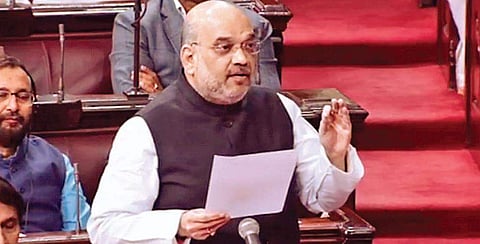

It is symbolic that the long pending Jammu and Kashmir (Reservation) Amendment Bill, 2019, was passed in the Lok Sabha on June 28 and unanimously passed by the Rajya Sabha on July 1.
The passage was symbolic because it came in the period between June 23 and July 6, Dr Syama Prasad Mookerjee’s death anniversary and birth anniversary respectively.
A period when he is being increasingly remembered across the country, especially by the younger generations who wish to know of his life, contribution and legacy.
Indeed, the passage by both Houses was a tribute to the memory of Dr Mookerjee and also displayed that under Narendra Modi India has decided to move with tact, vision, skill and firmness to bring about a permanent solution to the Kashmir issue.
Home Minister Amit Shah’s masterly steering of the Bill, his unassailable and forceful speech in both the Houses, his masterly historical analysis of the root of the Kashmir imbroglio, his unequivocal words of warning to separatists and terrorists, his reiteration that Article 370 is of a purely temporary nature, his pledge that he had as much Kashmir’s interest at heart as anyone else but that he wished to see Kashmir and all other regions of the state enjoy equal opportunities for growth and development, made his speech a historic one.
One does not recall such an intense debate on Kashmir in the recent past.
The Prime Minister described the speech as “comprehensive and insightful” and urged on all those who wanted a “clearer understanding of the Kashmir issue” to listen to these speeches.
Listening to Shah speak on Kashmir, especially on the temporary nature of Article 370, one recalled Dr Mookerjee’s intervention in the debate on Kashmir in the first Lok Sabha on August 7, 1952.
In an incisive speech and counter point he had then asked Sheikh Abdullah whether he was “not a party to this Constitution? He was Member of the Constituent Assembly; but today he is asking for special treatment. Did he not agree to accept this Constitution in relation to the rest of India, including 497 states.
If it is good enough for all of them, why should it not be good enough for him in Kashmir?” This is a fundamental question that was never comprehensively and satisfactorily answered—neither by Jawaharlal Nehru nor by Abdullah.
It was a question that a large number of citizens of independent India have asked themselves since 1953—the year Syama Prasad died suddenly in detention in Srinagar.
Referring to points made by some members and analysts that there was an atmosphere of fear in the Valley, Shah conceded that there was indeed an atmosphere of fear, but it was only those who wished to break India and to see her dismembered were in a state of fear, and rightly so. Shah pointed out how a large number of separatists ring-leaders who have shut down schools, egged on mobs to burn down colleges, obstruct classes, have sent their own children for studies abroad in prestigious Ivy League institutions spending a fortune on their education.
Was this not duping the people of the state in the name of an elusive and false “aazadi”? Was it not destroying the lives and the future of the ordinary Kashmiris who want opportunities and avenues, asked Shah?
That the nationalist narrative on Kashmir is gradually becoming the dominant one, was clear from the unanimity on the passage of the Bill in the Upper House.
Parties like the Trinamool Congress which, till the other day, even doubted Pakistan’s complicity in the Pulwama terror attack, had to perforce declare that it would support the Bill. This unanimity essentially stems from the realisation that the days of appeasement politics are over in this country. Shah’s Kashmir intervention reinforced that point.
Twitter: @anirbanganguly